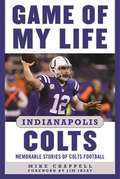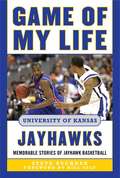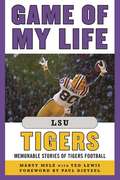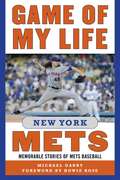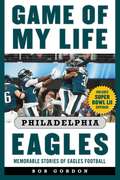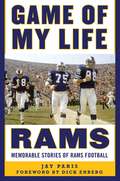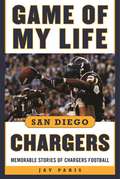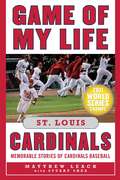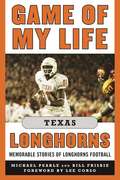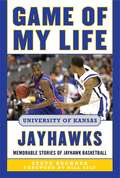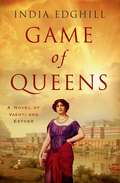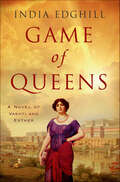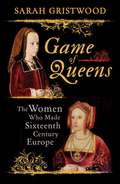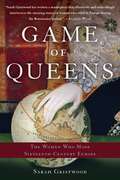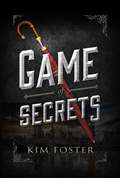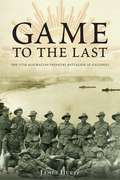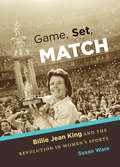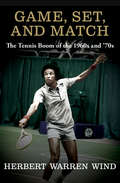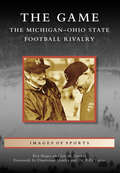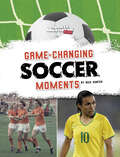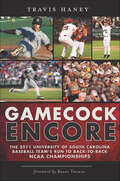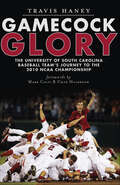- Table View
- List View
Game of My Life Indianapolis Colts: Memorable Stories of Colts Football (Game of My Life)
by Mike Chappell Jim IrsayIn 1984, after more than thirty years as the Baltimore Colts, the franchise moved to their present home in Indianapolis, where they began their tenure as one of the most successful NFL teams.In Game of My Life Indianapolis Colts, devoted fans can join their beloved team in the action on the field and behind the scenes in the locker room, as they relive many of the greatest moments in Indianapolis Colts history. Readers will relish tales of Colts’ glory through first-hand interviews with beloved players including Peyton Manning, Andrew Luck, Adam Vinatieri, Edgerrin James, and Marshall Faulk.Within these pages, Colts expert Mike Chappell will take readers through the early years in Indiana, the major 2007 Super Bowl win under Manning, and their continued success with quarterback Andrew Luck. Over thirty years of Colt experience is represented here, making it a must have for every true fan.Skyhorse Publishing, as well as our Sports Publishing imprint, are proud to publish a broad range of books for readers interested in sports-books about baseball, pro football, college football, pro and college basketball, hockey, or soccer, we have a book about your sport or your team.Whether you are a New York Yankees fan or hail from Red Sox nation; whether you are a die-hard Green Bay Packers or Dallas Cowboys fan; whether you root for the Kentucky Wildcats, Louisville Cardinals, UCLA Bruins, or Kansas Jayhawks; whether you route for the Boston Bruins, Toronto Maple Leafs, Montreal Canadiens, or Los Angeles Kings; we have a book for you. While not every title we publish becomes a New York Times bestseller or a national bestseller, we are committed to publishing books on subjects that are sometimes overlooked by other publishers and to authors whose work might not otherwise find a home.
Game of My Life Kansas Jayhawks
by Bill Self Steve BucknerThe night of April 4, 1988, will forever live in the hearts of fans of Jayhawks basketball. On that night, the Jayhawks and their fans raucously celebrated the team's first national title since 1952. This game for the ages is one of 20 contests joyously recalled in this reissue of Steve Buckner's Game of My Life Kansas Jayhawks.For fans of the Kansas Jayhawks, Game of My Life Kansas Jayhawks is a fabulous stroll down memory lane in which several Jayhawks basketball legends detail the events that culminated in the game of their lives. Players from the 1988 NCAA Championship squad share their insights into the collective game of their lives, as well as the defeat of rival Oklahoma in the national championship game. Former players featured include Mark Turgeon, Drew Gooden, Steve Woodberry, Paul Pierce, Nick Collison, Rex Walters, and Kirk Hinrich, along with former coach Larry Brown and many more legends.
Game of My Life LSU Tigers: Memorable Stories of Tigers Football (Game of My Life)
by Ted Lewis Marty MuléA continuing and ongoing drama, LSU football has been marked by a string of improbable victories and sometimes valiant defeats. Game of My Life LSU Tigers is the chronicle of more than thirty-five of the greatest players as they tell the story of the game that meant it all.This book features the vivid and poignant single-game stories from three dozen of the most remembered Tigers games of the last eight decades. Readers will relive the fingertip catches, the bone-crunching hits, and epic touchdowns through the eyes—and from the memories—of the LSU players themselves. The words of Tigers such as Jim Taylor, Billy Cannon, Tommy Hodson, Carlos Carson, Matt Mauck, Rohan Davey, JaMarcus Russell, Marcus Spears, Jarvis Landry, and Leonard Fournette are all part of this storied collection that has become a must-have for any true Tigers fan and Bayou football lover.From the words of Tigers coaching legend Paul Dietzel, “This is really like a Tiger time machine, going back to LSU’s greatest football moments with the people who lived them, then and now.”
Game of My Life New York Mets: Memorable Stories of Mets Baseball (Game Of My Life Ser.)
by Michael Garry Howie RoseGame of My Life New York Mets, now newly updated, takes a personal look inside the biggest moments of the Mets’ greatest and most beloved players, from journeymen to superstars. Their most unforgettable games paint a picture of Mets history, as the franchise morphed from a dismal (though lovable) expansion team in 1962 to World Series Champions in 1969 and 1986 and then back to basement dwellers before meeting the Yankees in the 2000 Subway Series, and the Royals in a surprise appearance in the 2015 World Series. Fan favorite Ron Swoboda recounts making “The Catch.” Infielder Wally Backman relives the many thrills of playing on the ’86 Mets as they marched to a championship. All-Star Edgardo Alfonzo describes going six-for-six, including three home runs, in one of the most dominating offensive games in baseball history. Right-hander Bobby Jones recalls pitching the most dominating postseason game in Mets history, when he threw a one-hit shutout to clinch the 2000 National League Division Series against the San Francisco Giants. Current ace Jacob deGrom recounts his gritty series-clinching performance against the Dodgers in Game Five of the NLDS. Journalist Michael Garry, a lifelong Mets fan, also includes stories about Tom Seaver, Mike Piazza, and David Wright, among others.
Game of My Life Philadelphia Eagles: Memorable Stories of Eagles Football (Game of My Life)
by Bob GordonIn the newly updated Game of My Life Philadelphia Eagles, several legendary Eagles players share their fondest memories as each one recalls the game that sticks out the most from his Eagles career. The games they choose may very well be the ones with which you most associate them—a championship game, a playoff game, or a heralded comeback. But a fair number of choices may surprise you, as some Eagles cite encounters that time has buried deep within history’s vault. No matter which game each player chooses as his most memorable, each one tells a story. Each fills in a bit more of the complex legacy that defines the Philadelphia Eagles. More importantly, and certainly more poignantly, each story humanizes the larger-than-life warriors who strapped on their winged helmet each Sunday and played for the glory of the city of Philadelphia. Some of the former Eagles players profiled in this book are: • Chuck Bednarik • Brian Dawkins • Tommy McDonald • Bill Bergey • Seth Joyner • Keith Jackson • Mike Quick • Brian Baldinger • Claude Humphrey • Bill Bradley • Lito Sheppard • Vince Papale The new edition includes insight on the 2018 Super Bowl run.
Game of My Life Rams: Memorable Stories of Rams Football (Game of My Life)
by Dick Enberg Jay ParisIn 1946, the Cleveland Rams, having just won the NFL championship, moved to sunny Los Angeles. The LA Rams experienced immediate success, making four NFL Championship Game appearances in six years—one of which they won. From Los Angeles, the team moved to St. Louis in 1995, only to return to Los Angeles again in 2016. Regardless of the city or the stadium that they’ve called home, the Rams have compiled a myriad of memorable moments and at times have drawn record crowds. In Game of My Life Rams, award-winning sportswriter Jay Paris offers accounts of many of these moments, through the words of the players who experienced them firsthand—as members of the Los Angeles and St. Louis–based teams. Those legends featured include Roman Gabriel, Jim Hardy, Vince Ferragamo, Jack Youngblood, Kurt Warner, Eric Dickerson, Tom Mack, Nolan Cromwell, Fred Dryer, Henry Ellard, Johnny Hekker, and more. A great gift for any fan of Rams football—past or present!
Game of My Life San Diego Chargers: Memorable Stories of Chargers Football (Game of My Life)
by Dick Enberg Jay ParisSince their founding in 1959, the San Diego Chargers have tackled their way into the hearts of devoted SoCal football fans. In Game of My Life San Diego Chargers, fans can immerse themselves in all the greatest moments in Chargers history. Die-hard Chargers fan and award-winning sports writer Jay Paris expertly chronicles all of the greatest Charger moments, including the team’s thirteen playoff appearances, their heart-breaking loss in the 1995 Super Bowl, and their glory runs in the mid-2000s.Chargers fans can experience all the glory of their favorite team with first-hand interviews from over a dozen legendary players, including LaDainian Tomlinson, Dan Fouts, Ron Mix, Burt Grossman, Phillip Rivers, and Nick Hardwick. Each former great shares his most memorable game as a Charger, from the pregame jitters to the on-field glory, to the postgame locker room celebration. Game of My Life San Diego Chargers is the perfect gift for Chargers fans!Skyhorse Publishing, as well as our Sports Publishing imprint, are proud to publish a broad range of books for readers interested in sports-books about baseball, pro football, college football, pro and college basketball, hockey, or soccer, we have a book about your sport or your team.Whether you are a New York Yankees fan or hail from Red Sox nation; whether you are a die-hard Green Bay Packers or Dallas Cowboys fan; whether you root for the Kentucky Wildcats, Louisville Cardinals, UCLA Bruins, or Kansas Jayhawks; whether you route for the Boston Bruins, Toronto Maple Leafs, Montreal Canadiens, or Los Angeles Kings; we have a book for you. While not every title we publish becomes a New York Times bestseller or a national bestseller, we are committed to publishing books on subjects that are sometimes overlooked by other publishers and to authors whose work might not otherwise find a home.
Game of My Life St. Louis Cardinals: Memorable Stories of Cardinals Baseball (Game of My Life)
by Stuart Shea Matthew LeachDating back to the Gas House Gang of the 1930s and up to the club’s most recent World Championship in 2006, being a Cardinal has meant a style of play, a level of dedication, and a pride in being a member of a special group. This newly updated edition of Game of My Life St. Louis Cardinals exhibits not always the best game of someone’s career, but rather, the moment that stands out the most.
Game of My Life Texas Longhorns: Memorable Stories of Longhorns Football (Game of My Life)
by Michael Pearle Bill Frisbie Lee CorsoIn Game of My Life Texas Longhorns, prominent Texas players of the past and coach Darrell Royal share their fondest experiences and game-day memories of the games they remember the most, largely in their own words, with authors Michael Pearle and Bill Frisbie. Longhorn greats take the reader on a journey back to some of the greatest games in Texas history. How did Earl Campbell prove that he was worthy of the Heisman? How did a Snickers bar help convince Ricky Williams to return to Texas for his senior year? What was Vince Young really thinking just before the 2006 Rose Bowl? In Game of My Life Texas Longhorns, fans will find the answers to these questions and many more as more than twenty of the greatest players relive the moment that shaped their college football career. Within these pages, Texas fans will finally get the chance to step into the game and onto the grass with their favorite Longhorns legends. UT grads Michael Pearle and Bill Frisbie walk readers down memory lane to capture some of the most exciting, poignant, and fulfilling games ever played by the Horns. A must-have for any Horns fan.
Game of My Life University of Kansas Jayhawks: Memorable Stories of Jayhawk Basketball (Game of My Life)
by Bill Self Steve BucknerThe night of April 4, 1988 will forever live in the hearts of fans of Jayhawks basketball. On that night, the Jayhawks and their fans raucously celebrated the team’s first national title since 1952. This game for the ages is one of 22 contests joyously recalled in this reissue of Steve Buckner’s Game of My Life Kansas Jayhawks.For fans of the Kansas Jayhawks, Game of My Life is a fabulous stroll down memory lane in which several Jayhawks basketball legends detail the events that culminated in the game of their lives. Players from the 1988 NCAA Championship squad share their insights into the collective game of their lives, as well as the defeat of rival Oklahoma in the national championship game. Former players featured include Mark Turgeon, Drew Gooden, Steve Woodberry, Paul Pierce, Nick Collison, Rex Walters, Mario Chalmers, and Kirk Hinrich, along with former coach Larry Brown and many more legends.Skyhorse Publishing, as well as our Sports Publishing imprint, are proud to publish a broad range of books for readers interested in sports-books about baseball, pro football, college football, pro and college basketball, hockey, or soccer, we have a book about your sport or your team.Whether you are a New York Yankees fan or hail from Red Sox nation; whether you are a die-hard Green Bay Packers or Dallas Cowboys fan; whether you root for the Kentucky Wildcats, Louisville Cardinals, UCLA Bruins, or Kansas Jayhawks; whether you route for the Boston Bruins, Toronto Maple Leafs, Montreal Canadiens, or Los Angeles Kings; we have a book for you. While not every title we publish becomes a New York Times bestseller or a national bestseller, we are committed to publishing books on subjects that are sometimes overlooked by other publishers and to authors whose work might not otherwise find a home.
Game of Queens: A Novel of Vashti and Esther
by India EdghillFor fans of The Red Tent and The Dovekeepers, India Edghill breathes new life into the biblical story of Vashti and Esther with her signature historical richness, epic scope, and sweeping romance. <P><P> You may know part of the story already, but you only know what history has passed along. The story of how Vashti, Queen of Queens, the most beautiful woman in all the empire, defied the king her husband and so lost her crown. The story of how Ahasuerus, King of Kings, commanded that the most beautiful maidens be sent to his court so he might choose a new queen. And you may know how he set the queen's crown upon the head of the virtuous and beautiful Esther, and how Queen Esther herself defied both king and law to save her people from a treacherous fate.<P> What India Edghill brings us in Game of Queens is the story of power and treachery, blood and deception, bravery and romance that surrounds the court of Ahasuerus and brings to life two of the most celebrated female heroines in all of history.
Game of Queens: A Novel of Vashti and Esther
by India EdghillFor fans of The Red Tent and The Dovekeepers, India Edghill breathes new life into the biblical story of Vashti and Esther with her signature historical richness, epic scope, and sweeping romance. You may know part of the story already, but you only know what history has passed along. The story of how Vashti, Queen of Queens, the most beautiful woman in all the empire, defied the king her husband and so lost her crown. The story of how Ahasuerus, King of Kings, commanded that the most beautiful maidens be sent to his court so he might choose a new queen. And you may know how he set the queen's crown upon the head of the virtuous and beautiful Esther, and how Queen Esther herself defied both king and law to save her people from a treacherous fate.What India Edghill brings us in Game of Queens is the story of power and treachery, blood and deception, bravery and romance that surrounds the court of Ahasuerus and brings to life two of the most celebrated female heroines in all of history.
Game of Queens: The Women Who Made Sixteenth-Century Europe
by Sarah GristwoodIn sixteenth-century Europe, an extraordinary set of women created a unique culture of feminine power that saw them run the continent for decades. Despite often being on opposing sides of power struggles both armed and otherwise, through family ties and patronage they educated and supported each other in a brutal world where the price of failure was disgrace, exile or even death.Following the passage of power from mother to daughter and mentor to protégé, Gristwood reveals the unorthodox practices these women adopted to avoid patriarchal control and assesses the impact they had on shaping the world around them. Epic in scale, this game of queens is a remarkable spectacle of skill and ingenuity, confronting the challenges faced by women in power - many of which still hold relevant today.The players in this Game of Queens are: Isabella of Castile, Margaret of Austria, Louise of Savoy, Anne de Beaujeu, Katherine of Aragon, Marguerite of Navarre, Anne Boleyn, Catherine de Medici, Mary Tudor, Elizabeth Tudor, Jeanne d'Albret and Mary Stuart.
Game of Queens: The Women Who Made Sixteenth-Century Europe
by Sarah Gristwood"Sarah Gristwood has written a masterpiece that effortlessly and enthrallingly interweaves the amazing stories of women who ruled in Europe during the Renaissance period."-Alison Weir Sixteenth-century Europe saw an explosion of female rule. From Isabella of Castile, and her granddaughter Mary Tudor, to Catherine de Medici, Anne Boleyn, and Elizabeth Tudor, these women wielded enormous power over their territories, shaping the course of European history for over a century. Across boundaries and generations, these royal women were mothers and daughters, mentors and protégées, allies and enemies. For the first time, Europe saw a sisterhood of queens who would not be equaled until modern times. A fascinating group biography and a thrilling political epic, Game of Queens explores the lives of some of the most beloved (and reviled) queens in history. "Densely packed with fascinating material, this immensely ambitious undertaking succeeds triumphantly."-Literary Review (UK)
Game of Secrets
by Kim FosterFelicity Cole sells flowers in the streets of Victorian London to feed herself and her young brother. But she has a close-guarded secret—her brother is a Tainted, born with special abilities that society fears and a shadowy organization called the Hunstsman scours the country to eliminate. When Felicity becomes the target of one of these individuals, she discovers something horrible: she’s Tainted, too. Rescued by a mysterious gentleman on the eve of execution, she's whisked away to a school funded by Queen Victoria, established to train selected Tainted into assassins in service of the crown. Struggling to harness her incredible strength, speed, and agility, and despised by her classmates, all she wants is to use her new position to find a cure so she can be normal and reunited with her brother. But with the Golden Jubilee fast approaching and the discovery that there’s a traitor in their midst, she has no choice but to embrace the one thing she’s been fighting all along.
Game of Thrones - A View from the Humanities Vol. 1: Time, Space and Culture
by Cristina Rosillo-López Alfonso Álvarez-Ossorio Fernando Lozano Rosario Moreno SoldevilaThis book reflects on time, space and culture in the Game of Thrones universe. It analyses both the novels and the TV series from a multidisciplinary perspective ultimately aimed at highlighting the complexity, eclecticism and diversity that characterises Martin’s world. The book is divided into three thematic sections. The first section focuses on space—both the urban and natural environment—and the interaction between human beings and their surroundings. The second section follows different yet complementary approaches to Game of Thrones from an aesthetic and cultural perspective. The final section addresses the linguistic and translation implications of the Game of Thrones universe, as well as its didactic uses. This book is paired with a second volume that focuses on the characters that populate Martin’s universe, as well as on one of the ways in which they often interact—violence and warfare—from the same multidisciplinary perspective.
Game to the Last: 11th Australian Infantry Battalion at Gallipoli (The\australian Army History Ser.)
by James HurstGame to the Last reveals the story of the men who would become "one of the finest battalions which served in the war", the West Australian 11th Infantry Battalion, AIF, during the gruelling Gallipoli Campaign of 1915. The narrative follows the battalion members as they leave their homes and lives in Western Australia, embark for overseas, experience the excitement and boredom of arid and exotic Egypt, and undergo their baptism of fire in the first wave of the Australian and New Zealand landings at Gallipoli on 25 April 1915.
Game, Set, Match: Billie Jean King and the Revolution in Women's Sports
by Susan WareWhen Billie Jean King trounced Bobby Riggs in tennis's "Battle of the Sexes" in 1973, she placed sports squarely at the center of a national debate about gender equity. In this winning combination of biography and history, Susan Ware argues that King's challenge to sexism, the supportive climate of second-wave feminism, and the legislative clout of Title IX sparked a women's sports revolution in the 1970s that fundamentally reshaped American society. While King did not single-handedly cause the revolution in women's sports, she quickly became one of its most enduring symbols, as did Title IX, a federal law that was initially passed in 1972 to attack sex discrimination in educational institutions but had its greatest impact by opening opportunities for women in sports. King's place in tennis history is secure, and now, withGame, Set, Match, she can take her rightful place as a key player in the history of feminism as well. By linking the stories of King and Title IX, Ware explains why women's sports took off in the 1970s and demonstrates how giving women a sporting chance has permanently changed American life on and off the playing field.
Game, Set, and Match: The Tennis Boom of the 1960s and '70s
by Herbert Warren WindThe leading players and outstanding matches of two thrilling decades in tennis history From Rod Laver&’s amateur Grand Slam in 1962 to the first US Open held at the National Tennis Center in Flushing Meadows, legendary sportswriter Herbert Warren Wind captures the grace and drama of modern tennis in this brilliant collection drawn from the pages of the New Yorker. The era&’s biggest names, including Margaret Court, Chris Evert, John Newcombe, Arthur Ashe, and Pancho Gonzales, thrill the crowds of Roland Garros, Wimbledon, and Forest Hills, and America&’s Davis Cup team battles patriotic linesmen and frenzied fans in an epic showdown against the Romanians in Bucharest. In &“Mrs. King versus Mr. Riggs,&” Wind paints a witty and evocative portrait of Billy Jean King&’s historic beatdown of Bobby Riggs, and in &“Forest Hills and the Final Between Connors and Borg,&” he vividly recounts one of the wildest and woolliest tournaments in the sport&’s history. Rendered with the same authority and eloquence that led the New York Times to declare Wind the dean of American golf writers, these dispatches from center court testify to the celebrated journalist&’s passion and versatility.
Game, The: The Michigan-Ohio State Football Rivalry (Images of Sports)
by Ken Magee Jon M. Stevens Dr Billy Taylor Dimitrious StanleyWith a history that stretches over a century, the Michigan-Ohio State rivalry is one of the oldest in college football. The two teams claim a combined 19 national championships, hundreds of All-Americans, and 10 Heisman Trophies. Each year, millions of Buckeye and Wolverine fans watch the two teams battle for an opportunity to win the Big Ten championship in a contest simply known as "the Game."
Game-Changing Soccer Moments (Sports Illustrated Kids: Soccer Zone!)
by Nick HunterGame-changing moments have happened throughout soccer’s history. From the star players who score match-winning goals to incredible comebacks and fan celebrations, readers will experience the excitement of unforgettable moments on the pitch.
Gamecock Encore: The 2011 University of South Carolina Baseball Team's Run to Back-to-Back NCAA Championships (Sports)
by Travis HaneyThe Gamecocks baseball team's surprising, heart-pounding run to the 2010 College World Series title seemed to many as if it could not be paralleled, in its excitement or its overall meaning to the school and the state of South Carolina. In 2011, though, they topped what they had already done, returning home champions and parading in style to the State House steps. In 2010, they honored the life of 7-year-old Bayler Teal, a cancer victim who died during the College World Series. In 2011, they celebrated the life of Omaha native Charlie Peters, a 13-year-old cancer survivor who served as a batboy for the team. The Gamecocks celebrated with a traditional dogpile near the pitcher's mound, Peters jumped on top of the mass of players and coaches.
Gamecock Glory: The University of South Carolina Baseball Team's Journey to the 2010 NCAA Championship (Sports)
by Travis HaneyAfter more than one hundred years of craving a champion, the University of South Carolina finally has one. The 2010 Gamecock baseball team won six consecutive games over eight summer nights to take the College World Series and lay claim to the school's first major national championship. From dancing around in a dark locker room to singing "Silent Night"? on the team bus after every victory in Omaha, these Gamecocks were as fun-loving as they were talented. And they did it all in the name of one special boy, seven-year-old Bayler Teal. Bayler passed away before he could see his beloved Gamecocks triumph, but the team's victory is a tribute to their number one fan. Join the Post and Courier's Travis Haney as he recounts this incredible team's historic season.
Gamecock: The Life and Campaigns of General Thomas Sumter
by Robert D. BassThis is a 1961 biography by distinguished historian and author, Dr. Robert D. Bass, of the elusive American general Thomas Sumter—nicknamed the “Carolina Gamecock,” for his fierce fighting style—and his campaigns against the British Army in the South during the American Revolution.Thomas Sumter (August 14, 1734 - June 1, 1832) was a soldier in the Colony of Virginia militia, a brigadier general in the South Carolina militia during the American War of Independence, a planter, and a politician. After the United States gained independence, he was elected to the United States House of Representatives and to the United States Senate, where he served from 1801-1810, when he retired.
Gamelife: A Memoir
by Michael W. Clune<p>You have been awakened. <p>Floppy disk inserted, computer turned on, a whirring, and then this sentence, followed by a blinking cursor. So begins Suspended, the first computer game to obsess seven-year-old Michael, to worm into his head and change his sense of reality. Thirty years later he will write: "Computer games have taught me the things you can't learn from people." <p>Gamelife is the memoir of a childhood transformed by technology. Afternoons spent gazing at pixelated maps and mazes train Michael's eyes for the uncanny side of 1980s suburban Illinois. A game about pirates yields clues to the drama of cafeteria politics and locker-room hazing. And in the year of his parents' divorce, a spaceflight simulator opens a hole in reality. <p>In telling the story of his youth through seven computer games, Michael W. Clune captures the part of childhood we live alone.</p>
